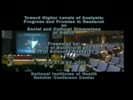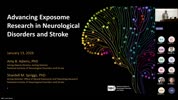| Description: |
To convene people from diverse populations living with or at risk for diabetes and digestive and kidney diseases and conditions, as well as researchers and clinicians from across disciplines, to understand the state of the science and identify opportunities for considering common biological pathways underlying the consequences of racism, marginalization, and discrimination across population groups and disease areas. The focus on interdisciplinary research is intended to foster the cross-pollination of ideas and shared learning, as well as to promote consideration of intersectionality across marginalized identities and the multidimensional research framework. Research questions to be addressed in the workshop include:What are the direct biological mechanisms and pathways underlying the relationship between RMD, social risks, and NIDDK diseases/conditions? How do these biological mechanisms interact with social and behavioral drivers of disease? Specific biological mechanisms, pathways, and systems of potential interest for this workshop include, but are not limited to, weathering, stress, allostatic load, hypothalamic-pituitary-adrenal axis, developmental programming, epigenetics, microbiome, immune function, inflammation, neuroendocrine status, endocrine disruption, and telomere shortening, among others. How do these biological mechanisms/pathways differ or overlap across the various population groups that experience RMD? How do these mechanisms combine for populations crossing multiple intersecting, marginalized identities (e.g., class, sex, gender, race)? How can we use an intersectionality lens to examine risk and protective factors? How do these biological mechanisms/pathways differ or overlap in the context of structural versus interpersonal forms of RMD, as well as between RMD and associated social risks? What biopsychosocial factors confer resilience to disease despite exposure to structural and interpersonal RMD, and what are the biological mechanisms through which this resilience occurs? How do we identify biological marker(s) to describe the experience of RMD? Does RMD contribute to the population-level differences in markers of key biological functions (e.g., differences in serum creatinine observed between Black and non-Black people in the United States)?What tools (e.g., measures, assessments, assays, wearables, apps) do we need to employ or develop to assess the impact that RMD may have on biology and health outcomes? This is day 2 of the meeting.
For more information go to https://www.niddk.nih.gov/news/meetings-workshops/2024/understanding-the-biological-mechanisms-2024 |











